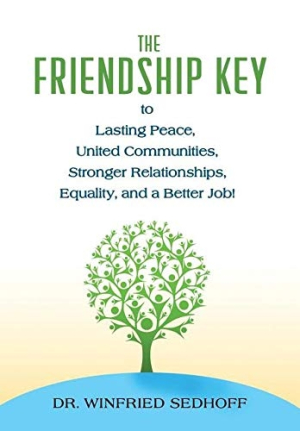The Friendship Key to Lasting Peace, United Communities, Strong Relationships, Equality, and a Better Job
The Friendship Key is a compelling self-help book that focuses on the central importance of friendship.
Making friends as an adult can be quite challenging, but in his book The Friendship Key, Winfried Sedhoff makes the case that friendship isn’t just about individuals; the qualities that make friendships strong have the potential to change a troubled world.
The book begins by examining the importance of friendship at all stages of human life. Connection was essential to human survival when people lived as tribal hunter-gathers, it says, but humanity’s ability to build meaningful friendships was marred by the rise of an agricultural society, which valued wealth, possessions, and status over community.
The text argues that humanity’s mindset shift resulted in barriers between people, and that in modern society, people feel lonely and disconnected as a result. To counter this, it proposes that people build connections based around ten specific values, or the ten desires of friendship. It asserts that they will lead to more meaningful connections and even counter problems like poverty, terrorism, and extremism.
Placing such lofty goals upon friendship may seem like reaching, but changing the world through friendship comes to seem possible because of the book’s friendly, conversational writing style. Its approachable and familiar language makes its concepts all the more persuasive.
Organized topically, the book’s first portion makes a case for friendship itself, citing specific examples throughout civilization where connection made communities strong, or where its absence made society weak. Its conviction that societies are pushing people farther apart over time is eye-opening, though its deep dive into history slows its progress. It draws out points to emphasize the importance of prioritizing friendship, and at times its conclusions feel too simple.
The second part of the book shifts its focus to the how-to aspects of friendship, introducing the ten desires of friendship directly. These desires—which include validation, seeking sameness, and appreciation—are designed to be addressed with family, friends, employees, and managers in order to improve relationships.
The second portion’s pace is perfect for provoking thought, and it suggests helpful activities to complement its points. Each chapter ends with a summary to help with casual retention and review. A hopeful tone helps to make the book’s complicated work feel less daunting.
The Friendship Key is an often compelling self-help book that focuses on the central importance of friendship for individuals and communities.
Reviewed by
Katerie Prior
Disclosure: This article is not an endorsement, but a review. The publisher of this book provided free copies of the book and paid a small fee to have their book reviewed by a professional reviewer. Foreword Reviews and Clarion Reviews make no guarantee that the publisher will receive a positive review. Foreword Magazine, Inc. is disclosing this in accordance with the Federal Trade Commission’s 16 CFR, Part 255.

